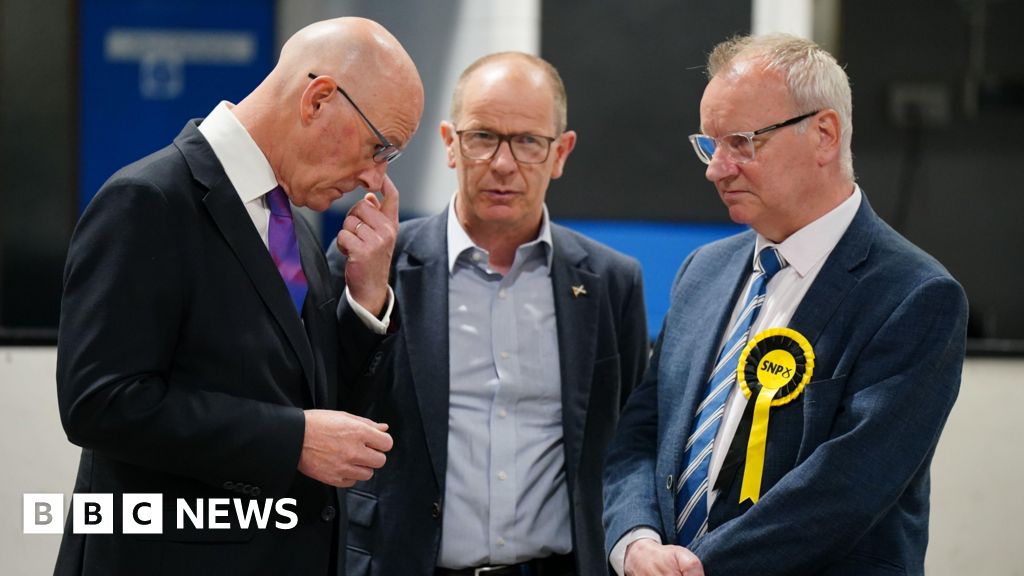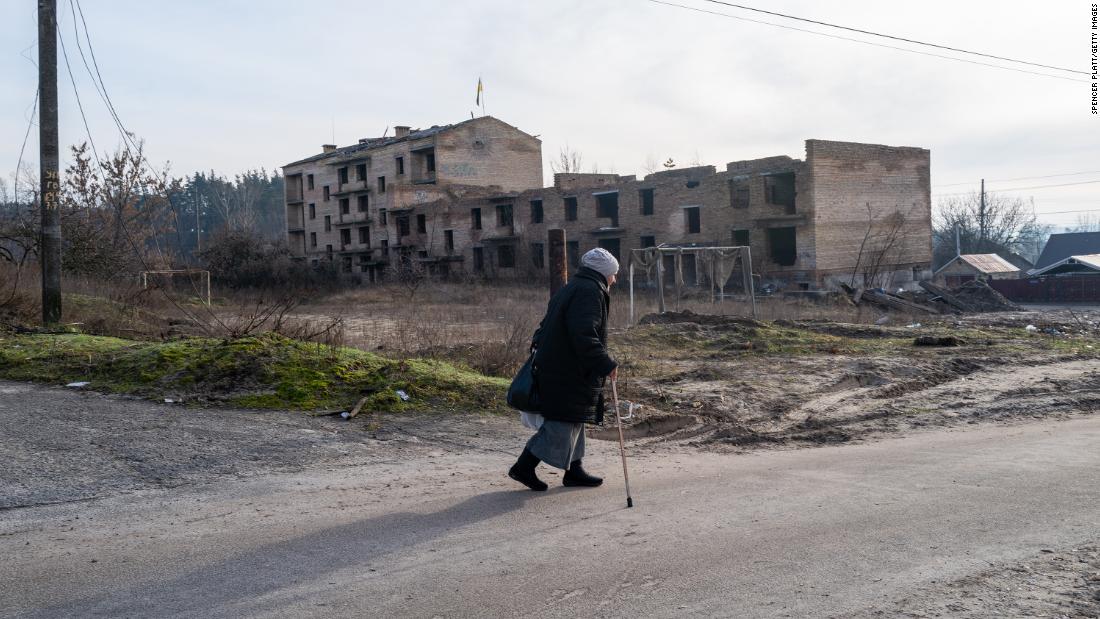By Angus Cochrane, BBC Scotland News
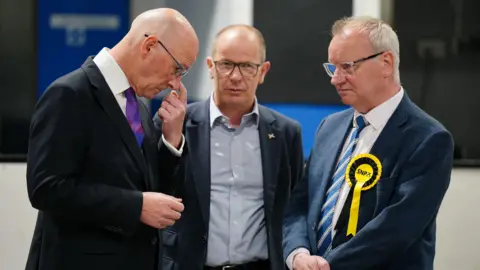 PA Media
PA MediaLabour have made gains from the SNP as constituencies in Scotland begin to declare results, with Sir Keir Starmer’s party on track for a landslide victory.
An exit poll predicted the SNP would be knocked back to 10 seats.
The Labour party secured significant vote swings from the SNP to take the Kilmarnock and Loudoun and West Dunbartonshire constituencies.
Kilmarnock and Loudoun was the party’s fourth safest seat and had been held by Alan Brown since 2015.
However, he lost more than 10,000 votes as a 22% vote swing to Labour’s Lillian Jones gave her a majority of more than 5,000.
Labour also gained West Dunbartonshire from the SNP with a vote swing of more than 18%.

The exit poll suggests that across Great Britain, Labour will win in 410 constituencies, giving them a majority of 170 at Westminster.
The Tories are forecast to drop to 131.
It also predicts 61 seats will go to the Liberal Democrats, and 13 to Reform UK.
It puts Plaid Cymru on four and the Green Party of England and Wales on two. Other parties are on track to win 19 seats.
The exit poll is published jointly by the BBC, ITV and Sky News and is designed to give an indication of the total number of seats in Great Britain that each party will win.
Because the sample size in of voters in Scotland is a smaller subset of the whole poll, the prediction should be treated with caution.
A clearer picture of the result north of the border will materialise after the first results have been declared.
The first results from Scotland are expected to be announced at about 02:00, with most constituencies declaring between 03:00 and 05:00.
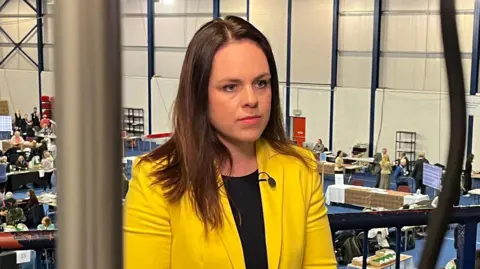
Deputy First Minister Kate Forbes told BBC Scotland News: “If the exit poll is correct then it will be a very difficult night for the SNP.”
She added: “Of course we take on board what the people of Scotland, the voters, are saying in this election and we will set out our agenda to regain and rebuild the trust of voters across Scotland.”
SNP leader and Scotland’s First Minister John Swinney said: “Scotland will be glad to see the back of this disastrous Tory government and I am confident that SNP votes across the country will make that happen.”
Former first minister and SNP leader Nicola Sturgeon said she believed the exit poll was “broadly right”.
“This is at the grimmer end of the expectations for the SNP,” she told ITV.
“This is not a good night for the SNP on these numbers and there will be a lot of questions that need to be asked as we come out of it.”
Alex Salmond, who preceded Ms Sturgeon as SNP leader and first minister, said the “slaughter of the SNP” was not due to its support for Scottish independence.
He added: “How could it be? The SNP did not even campaign on it.”
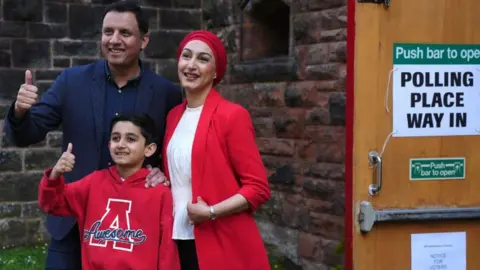 PA Media
PA MediaScottish Labour leader Anas Sarwar said his party would deliver change and “put Scotland at the heart of government”, adding: “For too long, Scots have been failed and let down.”
His party is aiming for a major revival, having won just one seat at the last general election in 2019.
The SNP returned 48 MPs in 2019, but that total was reduced to 43 by the time of the election – due mainly to defections.
The Scottish Conservatives won six seats in 2019, but increased this to seven when Lisa Cameron defected from the SNP.
Scottish Conservative leader Douglas Ross described it as a “historically bad night” for the Tories.
“There is no shying away from that at all and there will be a huge amount of reflection on the campaign and also clearly the last few years,” he told BBC Scotland News.
“It has been particularly difficult and there is no denying that.”
Ruth Davidson, the former Scottish Conservative leader, told Sky News the exit poll predicted a “massacre” for the Tories.
However, she said the projections were better than earlier internal Tory figures.
The Lib Dems returned four MPs north of the border at the last election.
Ex-Lib Dem leader Jo Swinson said the party was set to become a “substantial force again”.
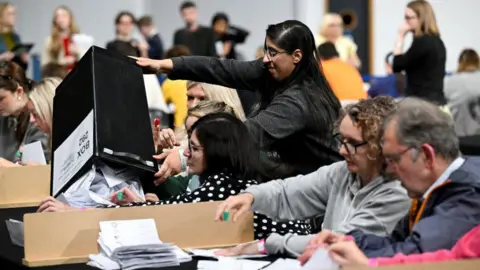 Reuters
ReutersThe number of constituencies in Scotland has been reduced from 59 to 57 in this election due to boundary changes – affecting all but 10 seats north of the border.
The alterations are based on recommendations by an independent commission in each part of the UK and are designed to reflect population shifts.
This means it will not be possible to do a direct comparison between this year’s results and the previous election in 2019.
Instead, to measure gains and losses, “notional” results will be used.
These have been calculated using localised voting data to estimate what the result would have been in 2019 had the current consistency boundaries been in place.
Using notional results, the picture is largely similar to the original 2019 outcome – with the SNP on 48 seats, the Tories on six and Labour on one. The Lib Dems, however, have lost two seats according to the notional results – down from four to two.
This election falls during school summer holidays for much of Scotland and some voters reported not receiving their postal ballots in time.
Councils were distributing replacement voting packs until 17:00 but some voters still had difficulty casting their ballot.
It is also the first time photo ID has been required for a national election in Scotland.
Note:- (Not all news on the site expresses the point of view of the site, but we transmit this news automatically and translate it through programmatic technology on the site and not from a human editor. The content is auto-generated from a syndicated feed.))
